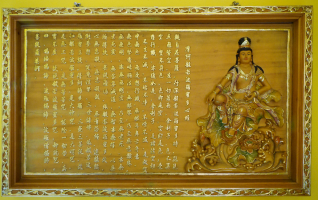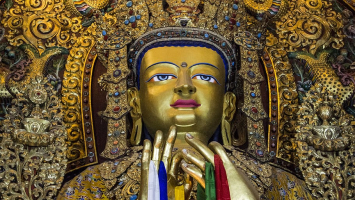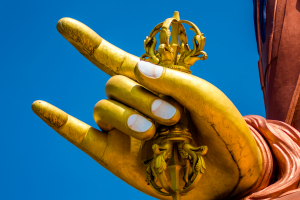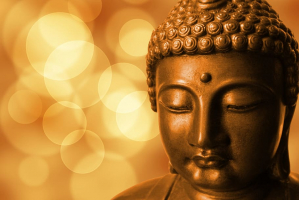Top 8 Most Famous Mahayana Precepts
The eight most famous Mahayana Precepts are ethical guidelines Mahayana Buddhists observe during special occasions or retreats. The Eight Mahayana Precepts are ... read more...usually taken for a limited period, such as a day or several days, to cultivate mindfulness, discipline, and compassion.
-
Not Killing is a fundamental rule in Buddhism found in many different kinds. It's part of the eight most well-known rules, followed by Buddhists everywhere, especially in Mahayana Buddhism. This rule means Buddhists shouldn't hurt or make any living thing die on purpose. It comes from the idea of not being violent and being kind to every creature.
This rule includes all living things, like animals and people, that can feel pain, happiness, or suffering. It tells Buddhists that their actions should not hurt others. This also means Buddhists shouldn't do things that cause harm indirectly or support killing in any way.
This rule also affects what Buddhists choose to eat and use. Some people choose not to eat meat or use animal products to follow this rule and stop animals from suffering. By following this rule, Buddhists grow as people and spiritually by being careful, understanding how others feel, and seeing how everything is connected.
Following Not Killing affects our karma, like the energy of our actions that affects our future. By not taking lives, Buddhists build up good karma, leading to better future experiences. This rule is a way to promise to be non-violent and celebrate life, learn about others, and be kind to all living things.
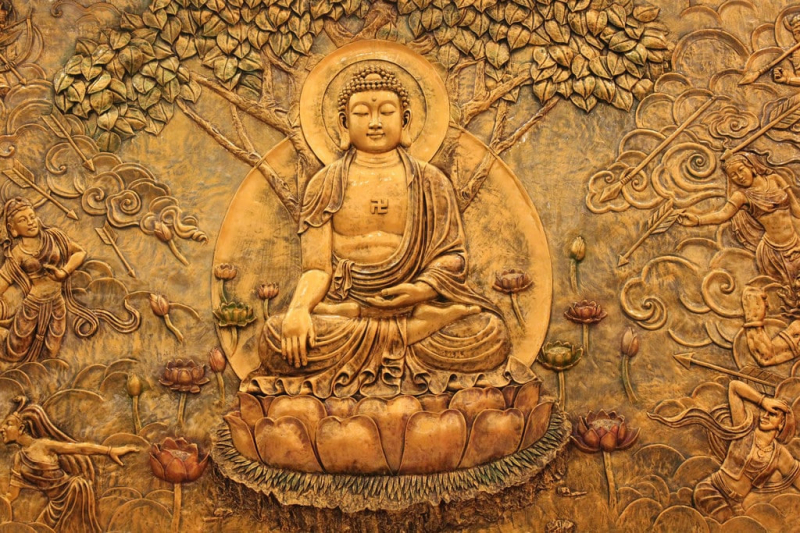
Photo by https://www.worldhistory.org/Mahayana_Buddhism/ Video by Langri Tangpa Buddhist Centre -
Not Stealing is one of the Eight Mahayana Precepts that Mahayana Buddhists follow for a specific time, like during particular times or retreats. This rule tells Buddhists not to take things that aren't given to them and to avoid using things that belong to others without asking. It's about doing honest work and not hurting others. When people follow this rule, they learn to be happy with what they have and think about others.
This rule doesn't just mean not taking physical things, like toys or money. It also means not taking ideas, time, or trust that belong to others. This rule reminds us to treat each other well and be trustworthy. People who follow this rule help create a friendly community by not taking things that aren't theirs.
Not Stealing connects to the Eightfold Path, a big part of Buddhist teaching. This path helps people avoid suffering and find peace. Following this rule is a part of the path, and it teaches us to act fairly and kindly.
This rule also helps people learn to control their wants and not be too attached to things. When people don't take what isn't theirs, they find more freedom and focus better on meditation and mindfulness. This helps them become wiser and closer to enlightenment. Not Stealing is about being honest, kind, and respectful. Following this rule helps Mahayana Buddhists make the world better and grow spiritually.
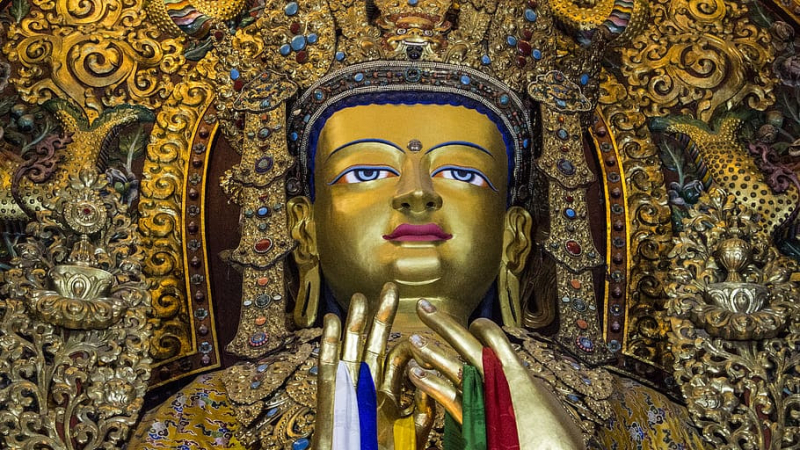
Photo on Wallpaper Flare Video by CBMS in USA -
Not Having Sexual Intercourse, one of the Eight Mahayana Precepts, encourages practitioners to abstain from engaging in sexual activity for the duration of the precepts. It aims to foster self-discipline and mindfulness. By temporarily setting aside sexual desires, practitioners create an opportunity to redirect their energy toward spiritual development, meditation, and self-awareness.
This precept emphasizes the importance of ethical conduct in relationships. It encourages individuals to approach sexuality with mindfulness, sensitivity, and mutual consent while refraining from actions that may cause harm or disrupt the peace of mind of others. Abstaining from sexual activity supports the cultivation of detachment and the reduction of attachment to sensual pleasures. This aligns with the broader Buddhist principle of letting go of attachments to foster inner peace and freedom from suffering.
Observing this precept can lead to a deeper understanding of sensual pleasures' impermanence and desires' transient nature. This awareness encourages practitioners to seek lasting happiness and contentment within themselves rather than through external sources.
In summary, the precept of Not Having Sexual Intercourse in the context of the Eight Mahayana Precepts promotes self-discipline, mindfulness, and ethical conduct. It encourages practitioners to navigate their relationships with care and consideration while supporting their spiritual journey toward greater awareness and liberation.
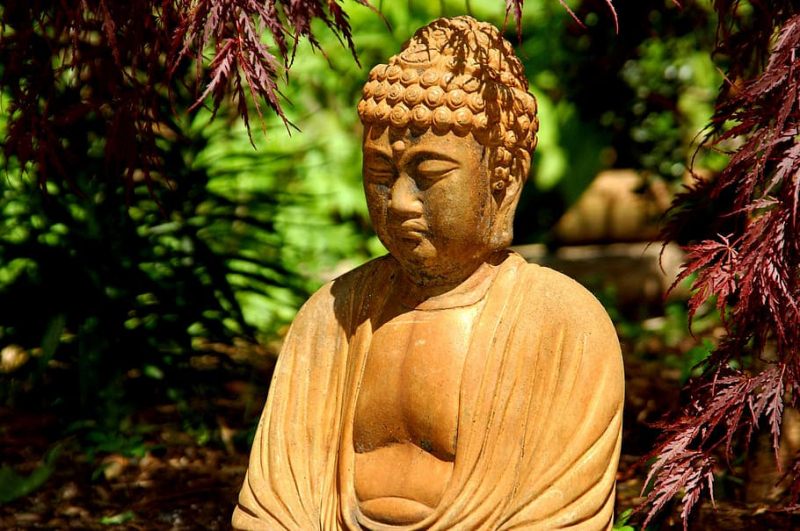
Photo on Pxfuel Video by AllVideoKingdom -
Not Lying is one of the Eight Mahayana Precepts observed by Mahayana Buddhists during specific periods as part of their spiritual practice. This precept underscores the significance of truthful communication and encompasses more than just outright lying. It includes avoiding any form of speech that lacks integrity, such as gossip, slander, and speech aimed at deception or manipulation.
Not Lying extends the broader principle of right speech within the Noble Eightfold Path. It encourages practitioners to communicate truthfully, kindly, and in ways that promote harmony. The precept serves as a reminder of the ethical responsibility to engage in speech that fosters understanding and respect among individuals.
Mindfulness plays a pivotal role in observing this precept. Practitioners are encouraged to reflect on their words' truthfulness and potential impact before speaking. This practice cultivates a heightened awareness of the intentions behind speech and contributes to ethical conduct in daily interactions. By Not Lying, practitioners honor the truth and uphold the integrity of their relationships.
In conclusion, Not Lying calls for honest, mindful, and responsible communication. It urges practitioners to cultivate speech that embodies their spiritual values, thereby nurturing an environment of trust, compassion, and authenticity in their interactions with others.
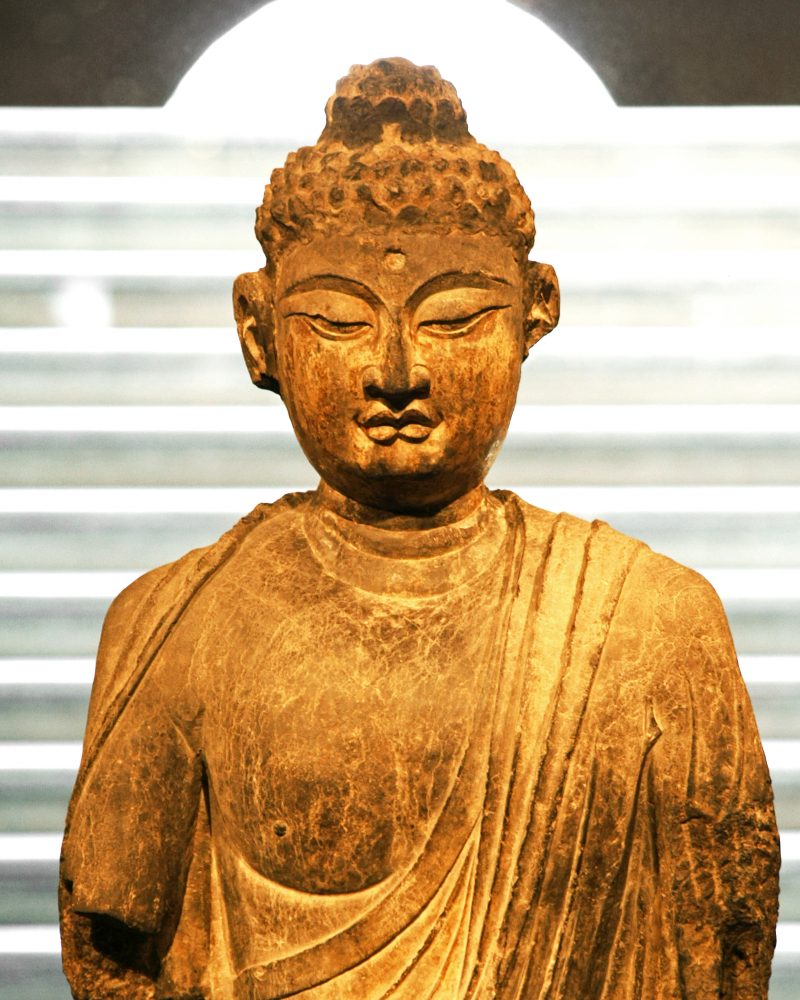
Photo on Flickr (https://www.flickr.com/photos/ru_boff/9427537219) Video by Setia Alam Sambodhi Buddhist Association -
No Intoxication is one of the Eight Mahayana Precepts that focuses on abstaining from consuming substances that alter the mind and impair one's clarity, mindfulness, and ethical judgment. This precept is based on the principle of maintaining clear awareness and mindfulness. Consuming substances that lead to intoxication, such as alcohol and recreational drugs, can cloud the mind and hinder one's ability to make conscious, rational decisions.
Practicing mindfulness and meditation requires a sharp and present awareness, which the use of intoxicants can disrupt. By No Intoxication, practitioners avoid potential negative consequences from impaired judgment, addiction, and behaviors that conflict with ethical values. The precept supports self-discipline and the development of a balanced and stable mind.
The precept also encourages practitioners to address challenges and difficulties in life without seeking refuge in substances that provide temporary relief. This approach fosters resilience and the cultivation of inner strength as individuals navigate the ups and downs of life.
In summary, the precept of No Intoxication is a commitment to mental clarity, mindfulness, and ethical integrity. It serves as a reminder of the importance of maintaining a balanced and present state of mind while cultivating resilience and inner strength.
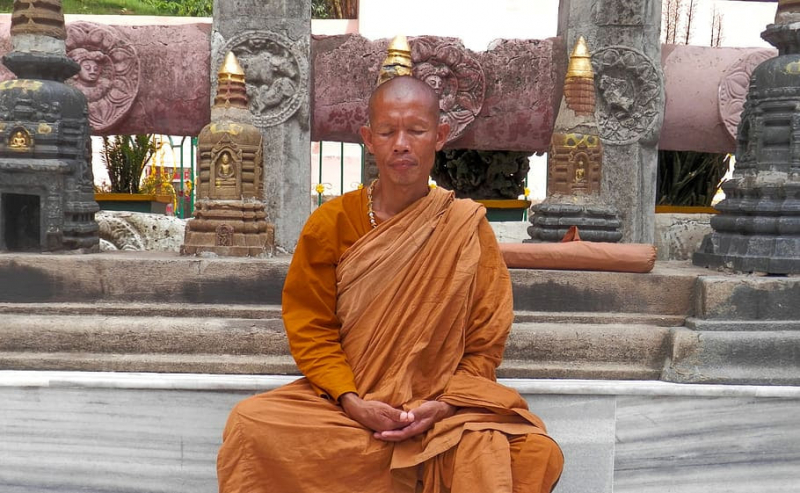
Photo on Wallpaper Flare (https://www.wallpaperflare.com/india-bodh-gaya-retreat-vipassana-thai-monk-tibetan-mahayana-wallpaper-edfzq) Video by AllVideoKingdom -
Not Eating At Wrong Times is one of the Eight Mahayana Precepts that Mahayana Buddhists follow during special times to eat mindfully. This rule isn't just about what Buddhists eat; it's about paying attention to when Buddhists eat.
This rule is about controlling and not going too far. Buddhists only learn to control their wishes and want by eating at certain times. This helps Buddhists control how much they eat and stops them from overeating.
Following this rule also helps Buddhists be more aware. When it's time to eat, Buddhists pay attention to their food and how it tastes and makes them feel. This helps Buddhists be thankful for their food and connect their mind, body, and what they're eating.
By not eating at the wrong times, Buddhists learn to tell if Buddhists're starving or want to eat because of feelings or habits. This makes Buddhists more aware of themselves and helps them make better choices about when to eat. It also allows Buddhists on their spiritual journey.
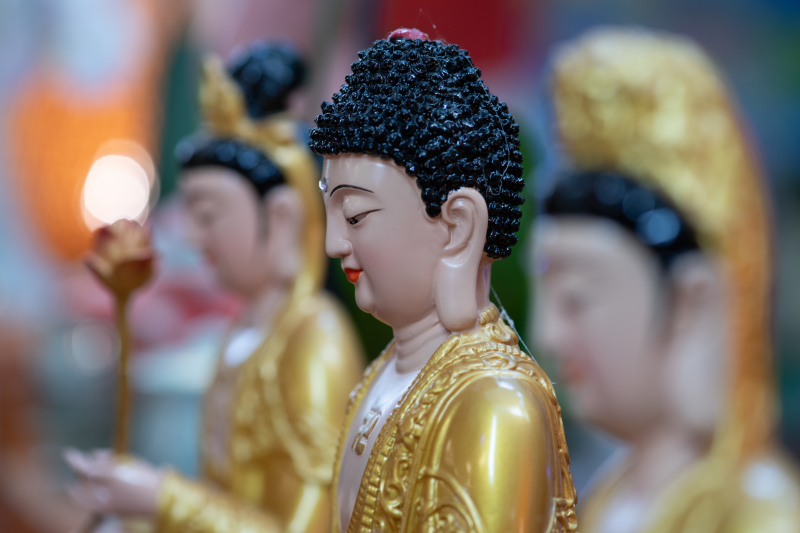
Photo on Flickr (https://www.flickr.com/photos/sniegowski/44193924594) Video by BuddhaWeekly -
Not Attending Entertainments or Adorning the Body is among the Eight Mahayana Precepts, encouraging practitioners to abstain from certain worldly activities and behaviors temporarily. This practice nurtures inner simplicity, mindfulness, and a concentrated emphasis on spiritual development, facilitating a deeper comprehension of the transient nature of external gratifications and the significance of intrinsic virtues.
Not Attending Entertainments encourages practitioners to distance themselves from entertainment that might distract or divert their minds from their spiritual path. It involves avoiding activities such as watching movies, attending parties, or engaging in pursuits solely for amusement. By refraining from entertainment, practitioners create space for introspection, meditation, and spiritual growth.
The second aspect of Not Adorning the Body encourages practitioners to avoid excessive preoccupation with personal appearance and adornment. This might involve avoiding wearing elaborate or attention-seeking clothing, jewelry, or cosmetics. By simplifying physical appearance, practitioners cultivate humility, contentment, and inner beauty, focusing on qualities that transcend the superficial.
Both aspects of this precept encourage a shift away from external distractions and attachments. By temporarily abstaining from indulging in entertainment and adornments, practitioners engage in simplicity. By relinquishing external distractions and embellishments, they create an environment conducive to self-reflection, meditation, and self-discovery.
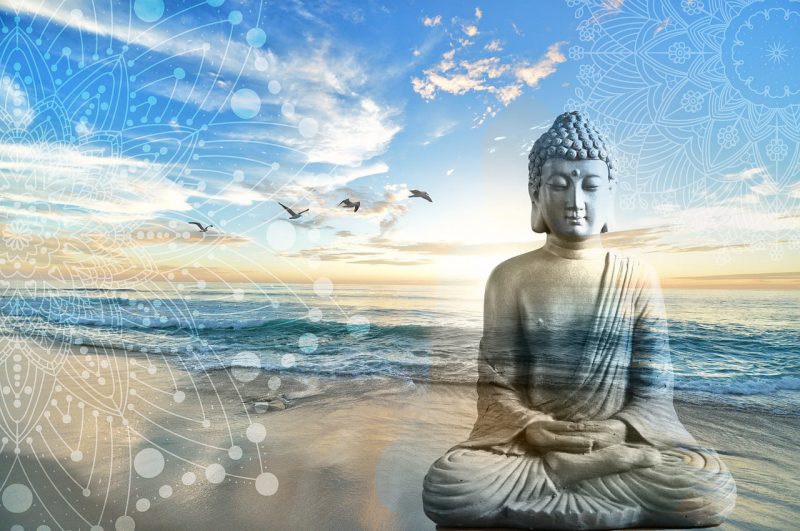
Photo on Needpix (https://www.needpix.com/photo/1879348/buddha-fantasy-zen-mandala-mer-sky-landscape-meditation-religion) Video by BuddhaVerse -
Not Using High or Luxurious Beds is one of the Eight Mahayana Precepts advocates temporarily abstaining from sleeping on opulent or elevated beds, opting for more straightforward sleeping arrangements. The practice is rich with symbolism, emphasizing the values of humility, non-attachment, and mindfulness.
Not Using High or Luxurious Beds signifies the significance of simplicity. By consciously choosing bare sleeping surfaces, practitioners embody the teachings of impermanence and detachment from material comforts. This practice fosters a contented mindset, reminding individuals that true happiness is not reliant on external luxuries.
The precept of Not Using High or Luxurious Beds also holds the power to cultivate humility. By relinquishing the allure of lavish sleep, practitioners subdue the ego's desire for luxury and status. This humility contributes to a more balanced and grounded perspective, reinforcing the understanding that pursuing inner growth surpasses the quest for external displays.
Furthermore, Not Using High or Luxurious Beds aligns with the principles of mindfulness and discipline. Sleeping on a simple bed encourages practitioners to remain mindful of their physical comfort, anchoring them in the present moment. This choice of modesty amplifies self-discipline and underscores their commitment to spiritual awakening. Ultimately, refraining from using high or luxurious beds is a practice that fosters humility, mindfulness, and the inner strength needed to transcend the allure of material excess and embrace the beauty of simplicity.
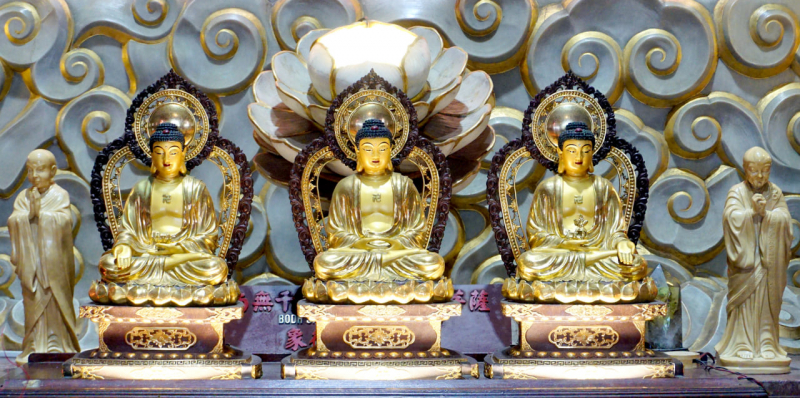
Photo on Wikimedia Commons (https://commons.wikimedia.org/wiki/File:11_Buddhas_and_Attendants_%2834378254193%29.jpg) Video by Dhamma is Timeless










